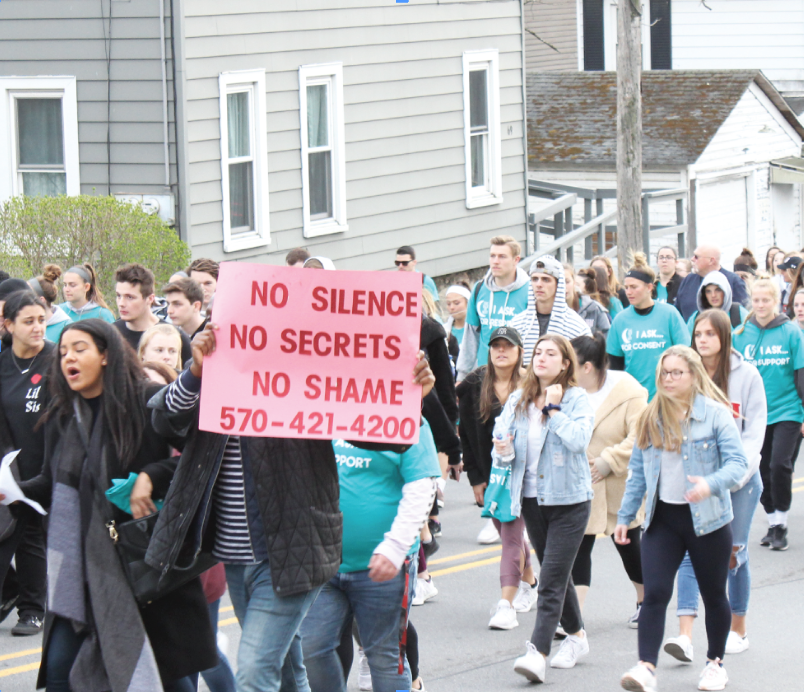
Charlese Freeman
Student Life Editor
As storm clouds filled the sky, another storm filled the streets of East Stroudsburg chanting, “Women unite, take back the night.”
Last Tuesday, a teal colored crowd of students, staff and local residents met at the Dansbury Depot to kick off the annual “Take Back the Night” rally. The supporters concluded the journey at ESU’s baseball field to hear stories from sexual assault survivors.
Jessie Laporte, the prevention and outreach coordinator at the Women’s Resource Center, lead the herd of people with her chants against sexual assault, date rape and sexual violence.
“Hey, hey…ho, ho, sexual assault has got to go,” roared Laporte, through her megaphone. The protesters, guided by the Monroe County police, trudged down Crystal Street. The crowd stopped for a moment of silence at the Leigh High Valley-Pocono Hospital to acknowledge the countless assault victims the hospital treated.
More than 100 community members, students, and staff came together, bringing awareness to sexual assault.
Participants had three t-shirt options, all highlighting different aspects of sexual assault. The shirts messages read: “I ask for… respect”, “I ask for…support” and “I ask for…consent.”
The university’s Gender and Sexuality Center spent the day giving out free t-shirts on campus. Even if students could not attend the rally, they were able to take a stand against sexual violence with their t-shirts.
Before the march began, the Monroe County Commissioner announced that April was sexual assault awareness month. President Marcia Welsh took the stage to support survivors. She insisted that survivors not only need to feel safe and supported, but they demand it.
“It is very important students know their bodies are protected, and they know that we support them,” said Joseph Akob, the executive director of Student Activity Association.
Protesters ended the rally in the ESU baseball field where the crowd stretched across the field to create a giant teal ribbon — a symbol used to represent sexual assault awareness.
Laporte explained sexual assault patterns based on her work with victims. She said in her 6 years as a coordinator only one person was assaulted by a stranger.
The reality is many victims are assaulted by people they think they can trust—friends, family members, and even friends’ partners.
According to the National Sexual Violence Resource Center or NSVRC, 1 in 5 women and 1 in 71 men will be raped at some point in their lives. In the U.S., 1 in 3 women and 1 in 6 men experienced some form of contact sexual violence in their lifetime.
NSVRC also notes that 51.1 percent of female victims of rape reported being raped by an intimate partner and 40.8 percent by an acquaintance.
Most victims of sexual assault are women. NSVRC’s statistics show 91 percent of rape and sexual assault victims are female, and only 9 percent are male. In 8 out of 10 cases of rape, the victim knew the perpetrator.
ESU professor and director of the Gender and Sexuality Center, Dr. Gene Kelly encouraged men to help end sexual violence.
He talked about how men have the power to change the conversation and change the perception of women.
Dr. Kelly also called for men to simply stop assaulting women. He explained, as a sexual violence educator, he’s tired of telling women to protect themselves. Dr. Kelly asked, “How do we make consent sexy?” He challenged men to interrupt negative conversations that devalue women.
The statistic of sexual assault – 1- in 5 women – has not changed in the past the 20 years. Dr. Kelley proposed changing the message, making men responsible for making changes.
“My first “Take Back the Night”, during the passing of the shell, was the very first time I admitted I was a survivor,” said Ariel Tucci, the Gender and Sexuality Center’s graduate assistant. “It was the first time I spoke those words, and it had been 6 years since.”
According to the movement’s website, “Take back the Night” is considered the first global movement against sexual assault. The protesters began
rallying against violence towards women in the 70s. The idea of “taking back the night” highlights the issue of women feeling unsafe when they walk the streets at night.
“Unfortunately, even though we talk about rape and assault, we still have a lot of instances where individuals are harassed or assaulted,”
said McClanahan. “This is an empowering event for them [survivors] to know that they are not alone and people stand with them.”
Email Charlese at:
cfreeman2@live.esu.edu

